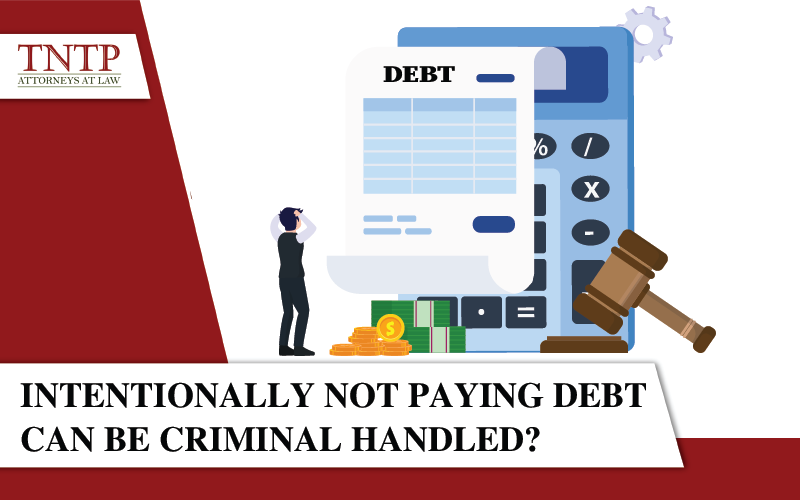Intentionally not paying debt can be criminal handled?

Borrowing must be paid, this is a basic principle in all activities of society and in business activities. But for many reasons, the debtor may not pay the debt or pay the debt on time, then the creditor may consider suing the debtor in Court according to civil procedures. However, in some cases, the debtor is qualified to pay the debt but deliberately does not pay the debt to the creditor, which can be criminally handled. Let’s find out with TNTP on this issue.
1. What is intentionally not paying debt ?
According to the provisions of the Civil Code 2015, the debtor is obliged to pay the debt in full when due, if the borrowed property is an object, it must return the object in the correct quantity and quality. In case the debt is unable to return the object, it may pay the equivalent amount borrowed if the creditor agrees. Thus, the debt repayment obligation is obligatory for the debt.
Intentionally not paying debt is when the debtor has enough money or property to pay the creditor but still does not make the payment for the purpose of avoiding liability to pay the debt.
Thus, the debtor has breached the payment obligation to the creditor, and the debtor’s actions, depending on the circumstances, may lead to criminal offenses under the provisions of the Criminal Code.
2. Intentionally not paying debt can be criminally handled
Many people mistakenly believe that the behavior of not paying debts on time will only be governed by civil relations. However, the fact that the debtor is qualified to pay the loan but intentionally not paying debt may be subject to criminal action.
Specifically, according to the provisions of Article 175 of the Criminal Procedure Code, the case where the debtor arrives at the time to return the property, despite having conditions and ability, but deliberately fails to pay it will be enough to constitute a crime of Abuse of trust to appropriate property.
In addition to being eligible for debt repayment but not paying the debt, if the debtor also has absconded, or intentionally destroys information and documents related to the loan/property for the purpose of not having to pay the debt can be considered as using deceitful tricks to appropriate property.
3. Form of sanction
Depending on the severity of the crime and the amount of non-repayment, the debtor may face sanctions such as imprisonment from 6 months to 3 years, or even up to 5 years to 12 years or even 20 years with the highest sanction frame.
In addition to the main sanction, the debtor may be subject to additional sanctions such as a fine of between VND 10,000,000 and VND 100,000,000, a ban from holding certain title, practicing certain professions or doing certain jobs from 01 to 05 years, or confiscate all or part of the property.
In the current difficult economic period, it is common for the debtor to fail to pay the debt on time, however, if the creditor determines that the debtor is qualified to pay the debt, but deliberately fails to pay the conditions to configure become a violation of the law, then the creditors can completely consider denouncing the crime against these subjects.
The above is an article by TNTP about the debtor’s intentionally not paying debt to the creditor, which can be prosecuted for criminal liability. Hope this article is useful to you.
Sincerely,



